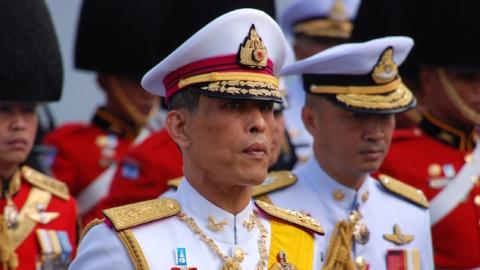Following the King’s death earlier this month, Thailand is preparing for Crown Prince Maha Vajiralongkorn to ascend the throne on December 1. As Reuters explains, the military junta stands to benefit most of all:
News that Thailand is making preparations for the crown prince to ascend to the throne on Dec. 1 is likely to allay worries that the kingdom was headed for a period of instability following the death of beloved King Bhumibol Adulyadej. […]
Thailand's junta has been preparing for the succession since taking power in a May 2014 coup, when the late king's health was already in decline. Those plans will culminate in a royal stamp on a new constitution that will institutionalize the army's political power.
Experts on Thai affairs say with Prince Vajiralongkorn on the throne, the military may see itself as no longer the crown's junior partner and take the opportunity to play an even bigger role in Thai political life.
Despite rumors of a succession crisis, it would appear that the Thai military is securely in control here, and top military brass has presumably reached an understanding with the Crown Prince. As the late King’s only son, Prince Vajiralongkorn is the natural choice for a successor, although his reputation in Thailand pales beside his beloved father, who was revered as a near-god throughout his 70-year reign.
Without a king of his stature on the throne, the Thai military junta will look to consolidate its own position over the country. This development will probably not be welcomed in Washington: recall that the U.S. condemned the 2014 military coup in harsh terms, with John Kerry saying it had “no justification.” The U.S. later suspended some military aid to Thailand.
The growing power of Thailand’s junta, together with the Philippines’ ongoing shift to China under Duterte, reflects a wider trend of anti-democratic drift in Southeast Asia. For the past 25 years, the belief that a wave of democracy was sweeping across Asia inspired confidence in the global spread of democracy as a cornerstone of American foreign policy. Asia’s democratic progress helped to solidify the belief that rising economic prosperity would inevitably lead to political democracy, thanks to the “laws of history.” This belief helped to mitigate American concerns about China’s economic rise, with the hope being that China would become more peaceful and democratic as it developed economically.
We are now getting used to life in a more complex world where the “laws of history” don't seem as constant, and the spread of democracy looks less inevitable. Thailand's shift to military rule provides more fodder for the larger debate over American foreign policy today, about how we make foreign policy in that more complicated environment where everything isn't automatically going our way.



















